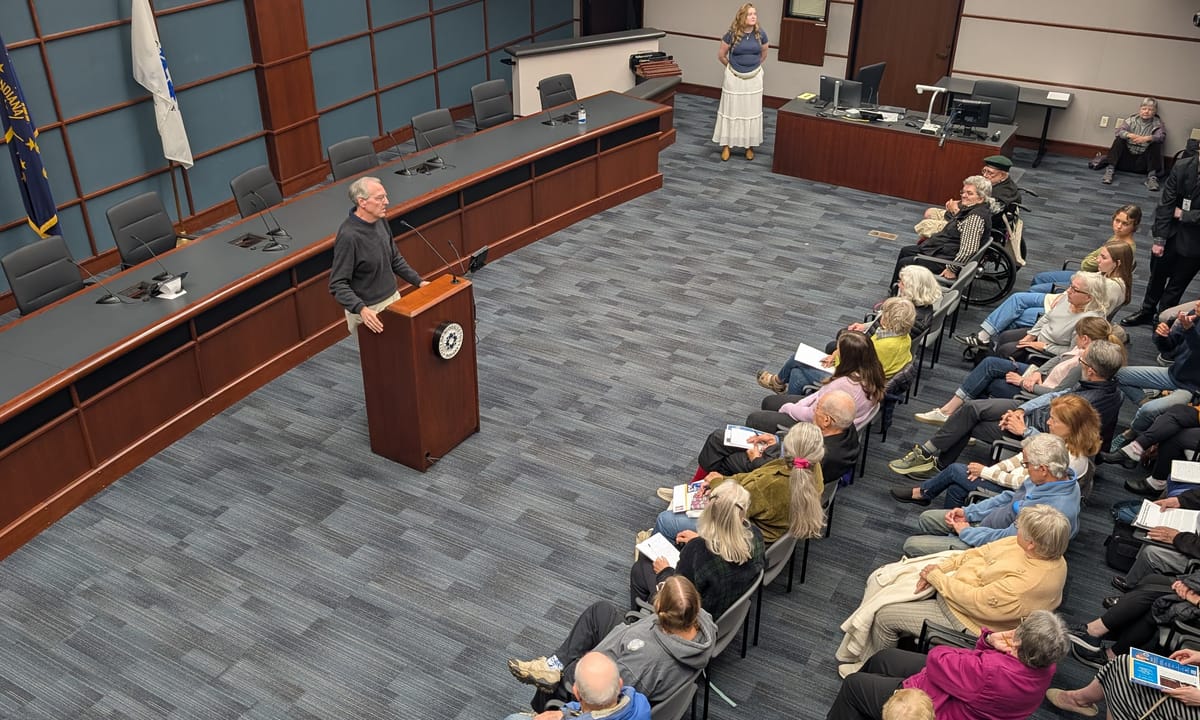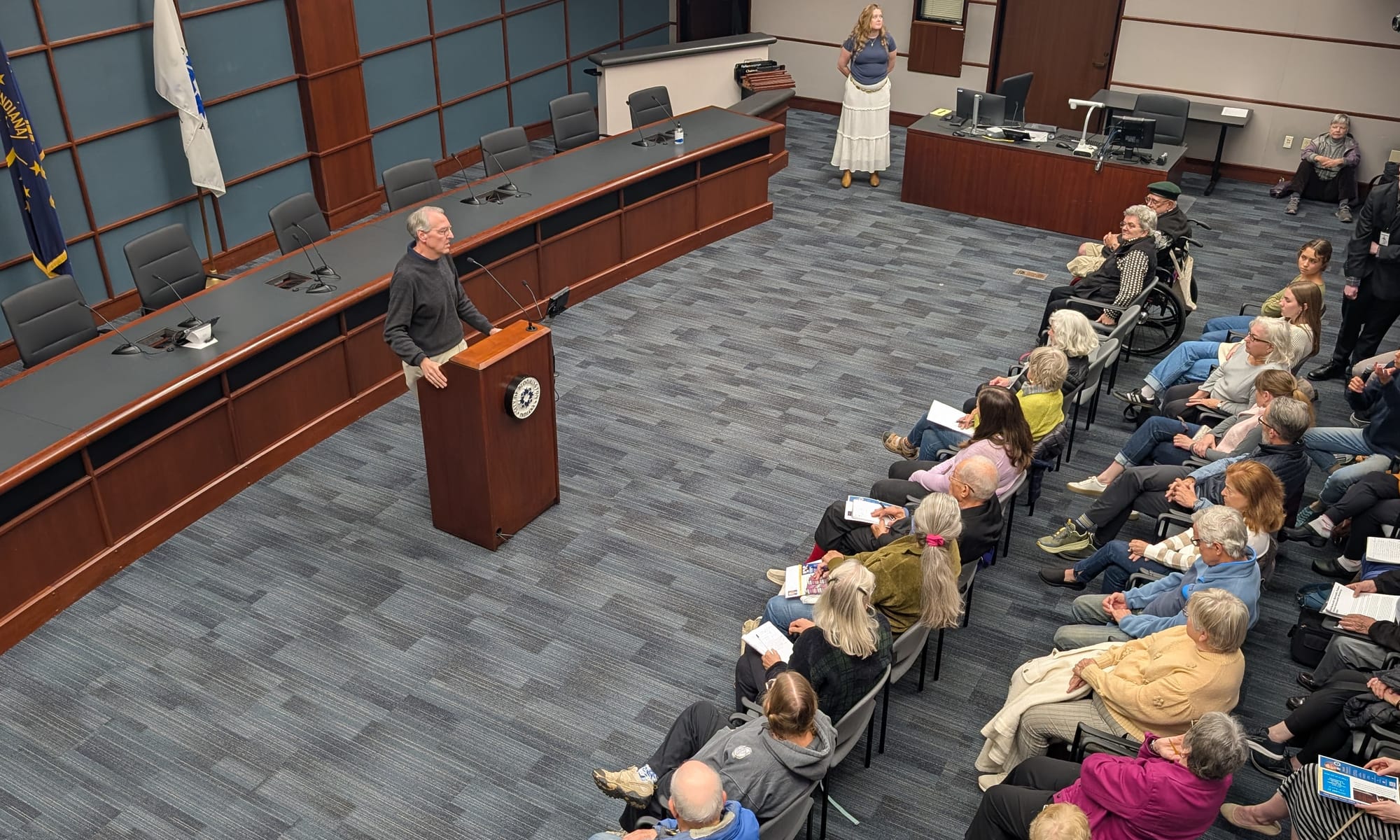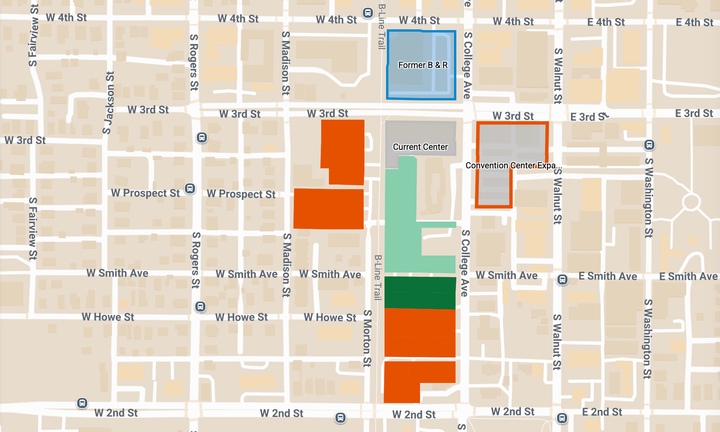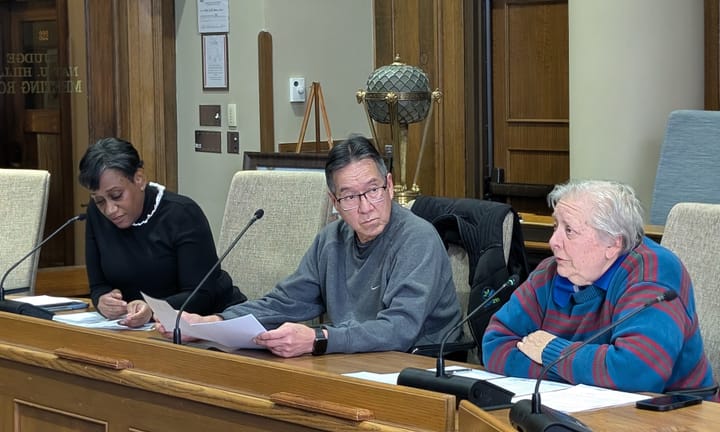Crowded Bloomington town hall comes same day as governor’s call for special legislative session on redistricting
On Monday, state representative Matt Pierce hosted a town hall about the GOP push for mid-decade redistricting in Indiana. Pierce’s event came after governor Mike Braun earlier in the day announced a special legislative session, starting Nov. 3, to address congressional district boundary changes.


Indiana’s map of congressional districts could soon be completely redrawn.
In a packed Bloomington city council chambers on Monday night, with every seat filled—including the balcony—state representative Matt Pierce hosted a community town hall to discuss the GOP push for mid-decade redistricting in Indiana.
Pierce is a Democrat representing District 61, which includes most of Bloomington. In the 2026 Democratic Party primary, Pierce is being challenged by Lilliana Young.
Pierce’s evening event came after Indiana governor Mike Braun earlier in the day announced a special legislative session, set to start next Monday (Nov. 3), to address both congressional district boundary changes and state tax code updates. Pierce’s event was scheduled before Braun’s announcement. Even if the potential for such action by the governor was widely known, Pierce told The B Square the same-day timing was a coincidence.
The governor’s move is analyzed as yielding to pressure on Indiana from U.S. President Donald Trump to redistrict mid-decade, instead of waiting until the regular decennial census. The idea is for the Republicans in the Hoosier state to use redistricting to increase their control from seven of nine congressional seats to nine of nine seats, in order to help the GOP preserve its majority in the U.S. House.
White House pressure on Indiana has been conveyed at meetings between Republican Indiana state legislators and administration officials in Washington, D.C., Pierce said, as well as by Vice President J.D. Vance during visits to Indianapolis. Pierce opened the forum with background on redistricting.
Procedural scenarios
Pierce described what he sees as a political chess game, where “there’s all kinds of different ways they could do it,” but also cautioned the audience: “Anytime I’ve ever been convinced I know exactly how something’s going to go … and I make a public pronouncement about it, the absolute opposite thing happens.” He described a range of possible procedural scenarios that could play out in the special session.
One scenario, Pierce said, is that Republican leadership might attempt to suspend traditional legislative rules and pass a redistricting bill in a single day. There’s a three-separate-reading-day rule, which is a constraint on Indiana’s legislature that says a bill must be read on three different days before it can be passed. However, if two-thirds of the members agree, they can vote to suspend the rule and pass a bill in a single day.
Republicans hold better than two-thirds majorities in both chambers of the Indiana General Assembly, controlling the House 70–30 and the Senate 40–10 over Democrats.
Pierce said that if the Republican supermajority “all hang together,” such a move could sidestep public scrutiny and amendment opportunities: “They could literally come in, suspend the rules in the morning, vote on the bill in the afternoon, and be home by dinner.”
However, Pierce also considered the possibility that not all Republican lawmakers would go along, especially not in the state House. Four House members could balk, leaving the party with just 66 votes, which is one short of two-thirds. “If more than three members say, ‘I’m not going to vote for suspending the three-separate-reading-day rule,’ then they’re kind of stuck, and they have to go through the normal process,” he said.
Legislative dynamics
Pierce pointed to subtle resistance among Republican senators, saying that private signals of insufficient support are often coded: “Last week, I was heartened to hear the press person for president pro tem [Rodric] Bray put out the word that ‘We don’t have the votes in the Senate.’ And I really interpreted that as a subtle way of saying to … the people in D.C., ‘It’s like, we’re just not going to do it.’”
But Pierce warned that national pressure could sill force the hand of reluctant lawmakers. “I think that the White House people are so intent on making this happen, they concluded the best way to pressure Republicans who said they don’t want to vote for [redistricting] is to get them into a session where the hot lights are on them, and force them to put votes up on the board.”
Asked how the public could influence the process, Pierce urged constituents to reach out directly to Republican legislators—especially those in swing districts—and to amplify dissent through grassroots organizing in those communities. “The most effective thing we have to figure out how to do is … network with like-minded people in those Republican districts, because they’re going to respond most to their own constituents.”
Pierce added, “If they start getting calls from people that say things like, ‘You know, I’m precinct committee person for the Republican Party out here, I love Donald Trump, but you know what, this isn’t right, and you really shouldn’t do it, because in Indiana, we’re about fair play,’ I think that would have the force of 100 people from Bloomington saying, ‘We hate Donald Trump and we like democracy, and why are you undermining democracy?”
Pierce also said, “Sometimes having just a humongous crowd show up at the state House can cause people to think twice.” He added, “I think that that can have a little bit of a psychological impact. But the key thing is people hearing from their own constituents.”
Legislative authority
Pierce put the special session in the context of a limitation on the governor’s power. Once a special session is called, “the leadership of the House and the Senate get to decide which bills are considered, and how long they’re in session when they meet.” The governor’s order gets the special session started, but after that it’s out of his hands, Pierce said.
Pierce predicted that the redistricting bill will likely originate in the Senate, because that chamber is where Republican support for the measure is most uncertain. “If they can’t get the votes to get it passed out of the Senate, they kind of know it’s game over,” he said, so it doesn’t make sense to have the House act first.
While the Senate is looking at redistricting, Pierce quipped, “The House has to do something to entertain itself for that period of time. So I think it will be doing that tax bill.” The tax bill was a reference to a federal tax compliance issue that the governor included in the special session’s agenda.
Pierce fielded questions from the crowd, which included one from a woman who said she thinks that in Trump the country is already living under a dictator. Redistricting is just “putting the nail in the coffin,” she said. Her question to Pierce: “What are we going to do to stop it?”
Pierce responded by saying, “Well, that’s a tough question, but I think the number one thing is we have to not be afraid. We have to not allow fear to silence us. And so we’ve got to speak out.” The answer drew applause from the crowd.




Comments ()